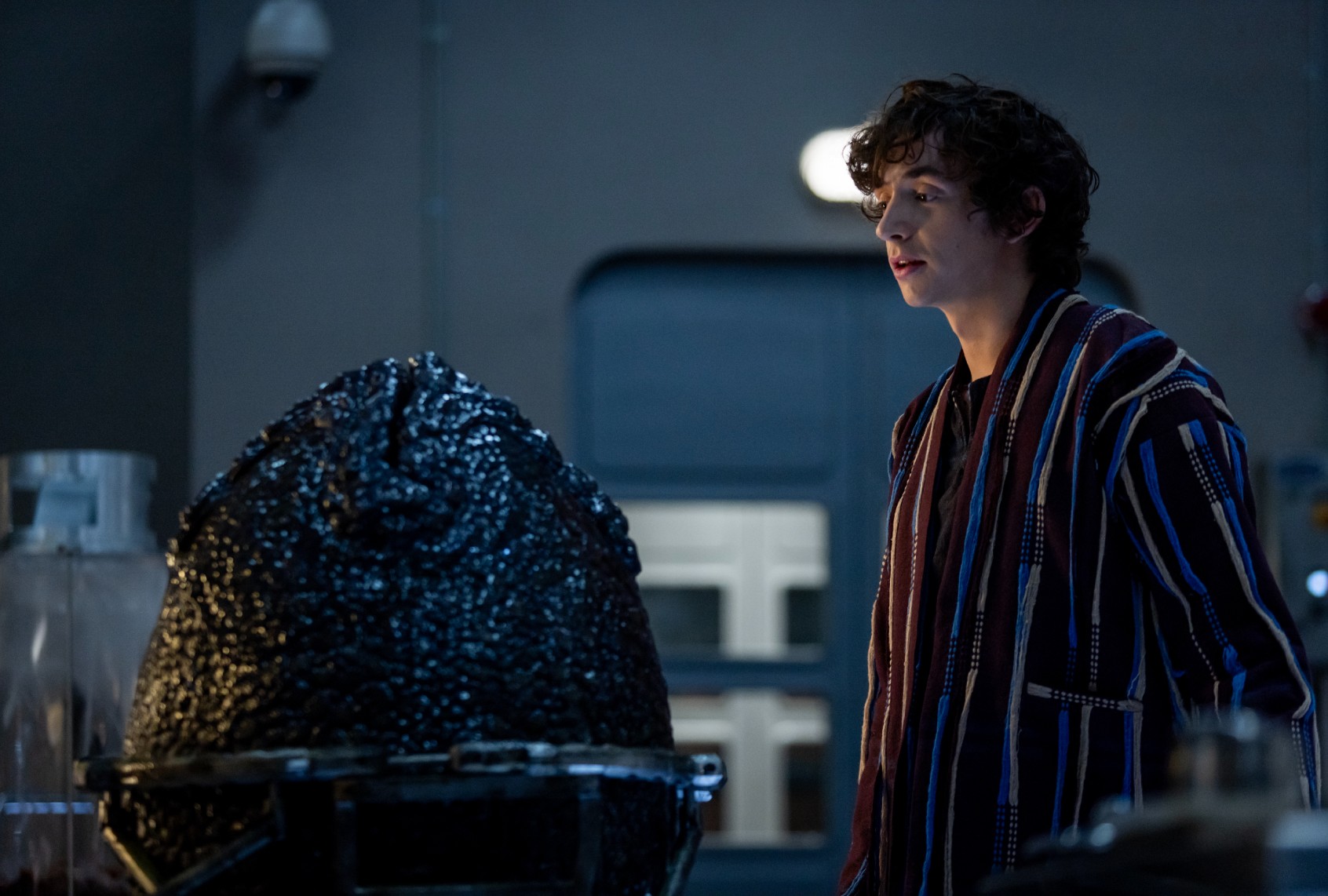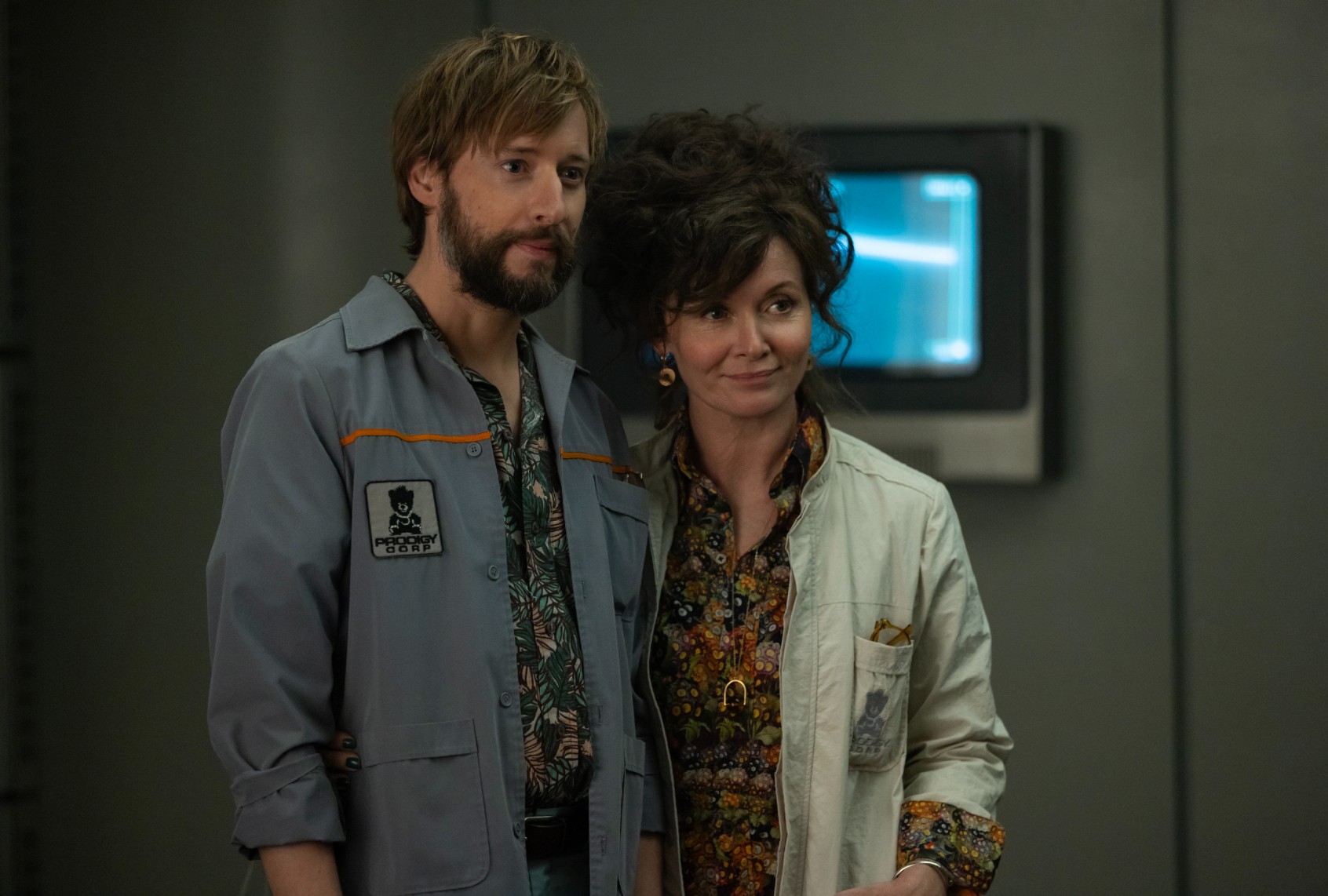Whoever came up with the saying about reading a person by looking at their shoes did not conceive of barefoot tech billionaires. Marc Andreessen, Mark Zuckerberg, Mark Cuban — all these men have showcased their social dominance by appearing in official photographs without shoes and socks. Elon Musk has, too.
But Andreessen, who co-founded Netscape, started the trend in 1996 by sitting on a throne for the cover of Time magazine. In the photo, his left ankle crosses over his right knee, exposing the sole of his foot. Next to him, the headline reads “The Golden Geeks.”
Maybe the greatest dangers to humanity aren’t demons falling from the heavens but men styling themselves as gods, in whom we’re supposed to place our trust.
Extrapolate that signifier by about 125 years, and it explains why Boy Kavalier, the peevish young supervillain of “Alien: Earth,” flaunts a habit of using his feet to do tasks that a normal person would do with their hands. He uses them to hold a tablet during a call. He flexes his metatarsal bones to indicate where he wants a subordinate to sit. While other busy people wish for another pair of hands, he’s occupying his while tapping a computer keyboard with one foot to streamline his efforts.
These might be interpreted as a polymath’s quirks – implying, perhaps, that actor Samuel Blenkin’s tech company founder is intellectually superior to a degree that he’s figured out how to maximize the use of all his extremities.
But when he faces down a more traditionally shod and tailored adversary, Boy Kavalier unleashes his dogs as negotiating weapons. He grins and flops them on the long boardroom table opposite his rival, who looks disgusted by this power move.
Americans are well accustomed to ridiculously wealthy magnates assuming the same pose at their desks, or as Richard Branson did, on national TV. However, in many Asian cultures (including in Thailand, where “Alien: Earth” was filmed), intentionally pointing one’s foot at a person is extremely insulting.
(FX) Samuel Blenkin as Boy Kavalier in “Alien: Earth”
Either way, the intended message is that Boy Kavalier believes everyone else is beneath him.
“Alien: Earth” stirs several conversations about what it means to be human, beginning with its core character, Wendy (Sydney Chandler), a synthetic being governed by the human consciousness of a child once called Marcy. Like other tech bros, Boy Kavalier has a singularly strange fixation he imposes on his corner of the universe. He is Peter Pan, and he dubs Wendy and other man-machine hybrids like her The Lost Boys – juvenile minds downloaded into bodies resembling human adults that will never age.
These transhumans are beta tests for extending the human lifespan, as noble an endeavor as prioritizing interplanetary travel.
But it’s also a cautionary forecast illustrating the worst-case scenario of what might happen if today’s technocrats seize the keys to tomorrow. Maybe the greatest dangers to humanity aren’t demons falling from the heavens but men styling themselves as gods, in whom we’re supposed to place our trust.
Once a Yutani spacecraft holding extraterrestrial cargo crashes in Prodigy’s territory, its CEO lays claim to it and (again, in the way of many tech magnates) turns his attention away from his synthetic “children” and toward these shinier, deadlier toys he doesn’t understand but knows he will. “Yeah, just assume I’m ahead of you. Always,” he dismissively tells his lead scientist, Kirsh (Timothy Olyphant), another android he’s created.
Blenkin’s Prodigy CEO joins an array of current TV and movie supervillains modeled on Musk – men who profess a keen interest in changing society for the better, only to take much more than they give.
However, the technocracy movement dates back to the 1930s, when it won thousands of followers and adopted some unnerving authoritarian hallmarks, such as its adherents dressing similarly and greeting each other with a specific salute.
Blenkin’s Prodigy CEO joins an array of current TV and movie supervillains modeled on Musk – men who profess a keen interest in changing society for the better, only to take much more than they give.
But the movement’s founders envisioned a civilization governed by science and technology and run by experts in those fields, removing all need for politicians, including fascists. They would also have abolished democratic elections.
Historian Jill Lepore explained in a New York Times column that Musk’s grandfather, Joshua Haldeman, was a technocracy movement devotee who eventually uprooted his family to South Africa to get in on that country’s exciting new apartheid craze. This part of the Tesla CEO’s family history resurfaced once he unleashed his young followers on federal civil servants under the banner of the Department of Government Efficiency, or DOGE.
Technocrats espoused that by doing away with government, money and capitalism in favor of having the techies run everything, humanity’s needs would be fulfilled. Artificial intelligence and robots would handle most of the labor currently done by people, leaving us to pursue enriching endeavors.
But the earliest technocrats may not have accounted for the billionaires’ and eventual trillionaires’ hunger for wealth, status and power.
Noah Hawley’s version of a future Earth divided between five corporations, including Weyland-Yutani and Prodigy, is much more plausible. If you read closely – and by that I mean look at a news report over the shoulder of a character doing oppositional research in the third episode, “Metamorphosis” – you’ll see that this is a future mankind allegedly asked for.
The story covers Prodigy’s relatively recent entry into a power-sharing partnership with an organization previously called the Triumverate, alongside a yet-to-be-introduced figure called Lynch. In a world run by corporations, one expects any “news” coverage to reflect a spin that benefits them. This version alleges that South America “has been clamoring to unify” under corporate rule.
“The devastating ‘guerras civil’ left much of the territory in drought and famine . . . Why Lynch wasn’t brought in [to the triumvirate] sooner was anyone’s guess,” it reads, concluding with a partial sentence about the recent discovery of an abundance of natural palladium there. Lynch gains resources, and the region gains order, but at what cost?
Boy Kavalier provides a few answers. Prodigy controls an area including what we currently know as Thailand. Its population teems with indentured workers like Wendy’s brother, Hermit (Alex Lawther). Boy Kavalier forces Hermit to become his employee in exchange for remaining with his sister, and so he can work off the cost of an artificial lung Prodigy put inside him to save his life.

(FX) Samuel Blenkin as Boy Kavalier in “Alien: Earth”
Hermit’s damaged, surgically removed organ becomes an incubator for a xenomorph zygote without his knowledge or permission. Boy Kavalier thinks he owns him, negating all necessity for his subject’s approval. Hermit and Wendy are property, and the stolen extraterrestrials are an undiscovered country, waiting to be conquered.
“Tell the brother he can stay, but he’s working for us,” Boy Kavalier tells a lackey, characterizing that instruction as “just a reminder that it’s my world. He just lives in it.”
The rest of humanity has already bowed down. Beyond Prodigy’s Neverland jungle compound is a crowded city resembling the slums of “Blade Runner.” In one scene, its whiz kid CEO grins from a billboard as “Prodigy is the future! Prodigy is forever!” repeats on a loop.
But there are those who submit and those who enable, including people who should know better. When one of his top scientists, Arthur Sylvia (David Rysdahl), expresses vehement doubts about his boss’ focus on the dangerous space creatures in his midst at the expense of their Hybrid project, his wife, Dame Sylvia (Essie Davis), brushes off his concerns with the very reasoning Silicon Valley touts to excuse its leaders’ trespasses.
“Yes, he breaks rules. He takes risks,” Dame says of Boy Kavalier. “Maybe that’s why he’s so far ahead!”
Boy Kavalier’s claim that products like the Hybrids are roadworthy when they haven’t been thoroughly vetted (like a certain car brand’s Autopilot feature) is not science, Arthur responds. “And I don’t care how rich you get, either something is or it isn’t.”
Start your day with essential news from Salon.Sign up for our free morning newsletter, Crash Course.
Ridley Scott’s xenomorphs have come to Earth before, as two crossovers with the “Predator” films establish. Those B-movies treat those contacts as isolated accidents that defy human understanding. Even Ellen Ripley couldn’t get Weyland-Yutani’s suits to believe her encounter with a creature that gestates inside a human host and has concentrated acid for blood.
“Alien: Earth” takes place two years before Ripley’s fateful encounter on the Nostromo. That conversation referenced above, taken from 1986’s “Aliens,” doesn’t happen for another 57. That’s more than enough time for a corporation to bury its mistakes. Like, say, funding a mission to collect an assortment of deadly extraterrestrial species, as the grandparent of Yutani’s 2120 CEO did.

(FX) David Rysdahl as Arthur Sylvia and Essie Davis as Dame Sylvia in “Alien: Earth”
Of course, in the corporate world, anything is only a mistake if it fails massively; even then, provided everyone survives, it’s treated as a lesson from which one is free to draw the wrong conclusions. Such as, “Next time, let’s keep our experimentation top secret and isolated in deep space. You know, where nobody can hear you scream.”
This is not to imply Yutani or Weyland (as seen in “Prometheus”) are more noble, just that Boy Kavalier is recognizable. Musk makes regular public appearances to tout his bureaucracy-streamlining efforts on behalf of taxpayers while exploiting his position as master and commander to make life worse for millions.
Gutting Twitter, rebranding it as X.com, and removing content safeguards made the social media platform a more effective propaganda machine for disinformation and white supremacy. In implementing DOGE, Musk broke nearly every functioning civil service department and gained access to every American’s most sensitive data without our consent.
A dominant Silicon Valley model is to move fast and break things; the entirety of the “Alien” franchise demonstrates how little potential human cost factors into such gambits. “Alien: Earth” simply gives the gamblers familiar faces and, in the case of Boy Kavalier, shows what the dirty, contemptuous feet walking all over us look like. And we may find that the scariest part of the story shows how we are presently ushering that speculative future into reality.
New episodes of “Alien: Earth” debut Tuesdays on FX and Hulu.
Read more
about the “Alien” universe



























